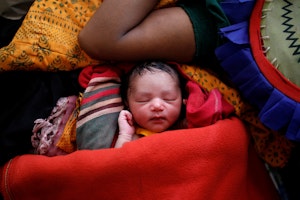Dominican Republic: How Statelessness Threatens Women and Families
By Liliana Gamboa & Laura Bingham
The president of the Dominican Republic, Danilo Medina, opened a regional conference on women's issues this week in the capital, Santo Domingo. But even as he prepared to tell delegates of his country's commitment to "fundamental rights" for women, a group of women launched a small protest.
The cardboard signs they held up highlighted the plight of tens of thousands of Dominican women who are reeling from a shocking blow to their rights: a ruling by the country’s constitutional court that threatens to strip them and their families of the right to Dominican nationality, previously guaranteed by the country’s constitution.
All are Dominicans of Haitian descent – whose families originally came to work and then settled in the Dominican Republic during the 20th century.
Perhaps the women’s conference will pause to consider the plight of Juliana Deguis Pierre, a 29 year old recognized Dominican national, whose Haitian migrant parents moved to the country decades ago. Juliana, a Dominican-born mother of four children, is officially registered as a Dominican citizen by birth. As she puts it in her own words, “I am from this country and nothing is going to change that.”
But according to the constitutional court she no longer meets the criteria for acquisition of Dominican nationality, and neither do all individuals similarly situated. The ruling renders her and her family stateless, without access to the rights and benefits of citizenship, such as a birth certificate, a passport and access to government medical insurance and education.
From 1929 until January 26, 2010, the constitution granted nationality to all children born on Dominican territory, except for those born to diplomats and to parents who were “in transit” at the time of the child’s birth. Throughout this long period, many children of undocumented Haitian migrants, who were born in the Dominican Republic, were registered as Dominican. They were provided with identity documents confirming their Dominican nationality, and lived their lives as any other Dominican would.
In recent years, however, the Dominican Republic has started to claim that individuals of Haitian descent have no right to Dominican nationality, on the theory that their undocumented parents were “in transit,” even when these families had been in the country for multiple generations. The Dominican Republic refused to change course on such policies even after the Inter-American Court of Human Rights issued a binding judgment in 2005 to end them.
The constitutional court’s recent ruling [pdf, Spanish only] has further cemented and expanded upon these haunting, openly racist nationality policies, by ordering the retrospective denationalizations of all persons whose parents were not legal residents in the Dominican Republic, rendering an ever-growing number of Dominicans of Haitian descent stateless.
To make matter worse, the ruling calls for the retroactive application of this determination to 1929, possibly rendering stateless up to four generations of Dominican-born persons of Haitian descent.
Stateless persons are in a state of permanent vulnerability. Denied access to birth certificates, passports, or other identification documents, stateless persons become, in effect, “non-persons” with no claim on governments who deny their existence and refuse to protect their most basic rights. They are systematically denied access to the full range of public goods and services essential to a decent existence, from freedom of movement and police protection, to healthcare, education, housing, and employment. Stateless populations are condemned to a cycle of poverty that is passed from generation to generation.
In the context of the regional women’s conference, organized by the Economic Commission for Latin America and the Caribbean (ECLAC) and attended by the executive secretary of UN Women, Phumzile Mlambo-Ngcuka, the Dominican authorities should reflect upon the impact that this decision will have on all Dominicans of Haitian descent, and particularly on women and children.
Other states in the region should step up and call for solutions that will respect the rights and inherent dignity of all, first and foremost by reminding their neighbor that statelessness is a regional issue. The creation of thousands upon thousands of stateless women and children cannot be tolerated under any circumstances.
Liliana Gamboa is the advocacy officer for the Open Society Justice Initiative project on antidiscrimination in the Dominican Republic.

Until October 2021, Laura Bingham was the senior managing legal officer for equality and inclusion in the Open Society Justice Initiative.
